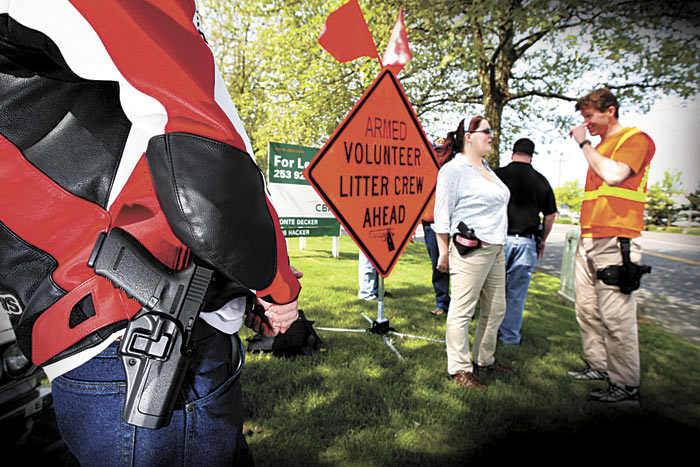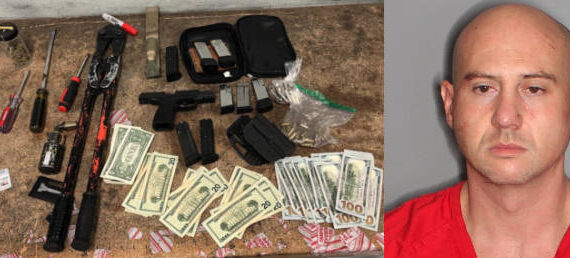Driving along I-5 in Fife, motorists are confronted with signage for fast-food restaurants and gas stations, which fight for space with advertisements for RV dealerships, car lots, and boat dealers. Nearby, a gigantic electronic billboard announces showtimes for ’80s rock bands performing at the Emerald Queen Casino.
Given all these distractions, one might miss the unobtrusive Adopt-a-Highway sign sponsored by Washington Open Carry.
Every month, as many as a dozen or more volunteers perform litter control along a two-mile stretch between the Puyallup River Bridge and the 54th Avenue exit. Unlike your average Kiwanis, Boy Scout, or church group, they’re armed not only with litter bags and poachers, but also Glocks, Smith & Wessons, and Sig Sauers. A large, diamond-shaped orange roadwork sign advises drivers: “Armed Volunteer Litter Crew Ahead.”
“I have seen folks stick their arms out the window and wave. Some will honk their horns, but I have seen some with their face to the glass pointing at the guys picking up trash,” says litter-control organizer Bill Starks of Tacoma. “Usually with those folks, I wonder if they took the time to actually read the orange safety sign, the one that says ‘Armed Litter Patrol Ahead’ with a picture of the gun at the bottom.”
It is a peculiar vision: someone who is not a law enforcement officer or security guard walking around in public with a pistol. This is the Open Carry movement, comprising gun owners who, for a variety of reasons, aren’t satisfied with concealing their weapons. The goal is to make the sight a more normal occurrence.
Washington is one of the 43 states where it is legal to carry a handgun without having to conceal it. But just because it’s technically OK to walk down the street with a Colt .45 strapped to your hip doesn’t mean a panicked citizen won’t punch 911 into their cell phone to report a person with a gun wandering around downtown Seattle. Nor has it prevented skeptical police officers from stopping, detaining, and often arresting people who are legally open-carrying.
Gray Peterson, a self-described “progressive gay liberal,” is probably the person most instrumental in first flying the Open Carry movement’s flag in Washington. Moving to the state from Oregon in 2004, he began a one-person crusade to educate local law enforcement agencies. Using his own resources, Peterson has obtained legal advice, and began printing up “Washington Gun Rights” pamphlets to give to police chiefs, patrol officers, politicians, and the general public.
“As a person who is a gay man, I have an aversion to being in the closet about anything,” Peterson says. When in Seattle, he doesn’t want to worry about getting assaulted just because he and his partner are holding hands. “There are attacking thugs going into Capitol Hill to bash gays, and police are only there to mop up after the fact.”
He says that by openly carrying, he is able to avert confrontation because criminals, seeing the handle of his semi-automatic jutting out of its holster, leave him alone. If he concealed the weapon—like most open-carriers, he has a concealed pistol license—Peterson feels he is more likely to get into a confrontation which will result in him having to draw his weapon.
Over the past two years, Peterson says he’s marched in Capitol Hill’s Pride Parade with his handgun in plain view. At the first parade, he was followed all day by Seattle police officers. Since then he’s been left alone, but having police question him elsewhere is nothing new.
In 2007, Peterson was stopped aboard a Washington State Ferry. A crewman saw he was packing and called the State Patrol to deal with him. Peterson de-escalated the situation by complying with the trooper. Ultimately, Peterson was in the right: He says he was later told by the trooper that it is legal to open-carry on ferries.
Despite this, local law enforcement will still stop gun owners who open-carry, particularly when panicked citizens call the cops when they see someone with a gun. “Obviously someone carrying an open handgun in an urban environment is a concern to us. It is very unusual for us to find someone carrying open,” says Sgt. John Urquhart, spokesperson for the King County Sheriff’s Office. “Any call we get about a person carrying a handgun openly, deputies will contact that person and, depending on circumstances, may or may not take the gun away for safety reasons.”
Urquhart cites RCW 9.41.270, which states: “It shall be unlawful for any person to carry, exhibit, display, or draw any firearm…in a manner, under circumstances, and at a time and place that either manifests an intent to intimidate another or that warrants alarm for the safety of other persons.”
Ultimately it comes down to an officer’s judgment. During last month’s antitax Tea Party Protest at Seattle’s Westlake Park, at least two men were open-carrying in the crowd. There were well over two dozen Seattle cops on the scene, and they didn’t look twice at the duo. In fact one of them, Jim Beal, a Vietnam War veteran from SeaTac, posed for pictures standing in front of the police and posted them at OpenCarry.org, the movement’s official Web site.
Not everyone is happy at the thought of folks walking around packing heat. “It is legal, so they are free to do that if that’s what they want to do,” concedes Kristen Comer, Executive Director of Washington CeaseFire. “The question to ask is whether or not their fellow community members want them engaging in that behavior. They [open-carriers] may feel safe knowing how to handle a handgun. [But] a lot of people in the community see them carrying a gun and don’t.”
Dave Workman, an editor at Gun Week magazine and author of the book Washington State Gun Rights and Responsibilities, says that there are many folks within the gun-rights community who feel that open-carriers are a political liability.
“The movement itself is a small segment of the gun-rights community. And some of them can be in your face about it,” Workman says, adding that there needs to be an education effort to explain that open-carrying is a legal practice and that people shouldn’t be alarmed. “If a person is walking down the street with a gun on his hip, going about his business, that’s not a crime.”
Nationally, the Open Carry movement was organized by a pair of law-school students, John Pierce and Mike Stollenwerk, who live in Virginia. Using the slogan “A right unexercised is a right lost,” the duo began organizing open-carriers in the Old Dominion State before expanding nationally. OpenCarry.org provides a forum for members to discuss pertinent legislation and legal cases, gun safety, and where you can and can’t carry, as well as more esoteric topics such as gun, ammo, and holster preferences.
“Open Carry has been growing since 2004,” Stollenwerk explains. “People increasingly see it as a valuable right that augments their concealed rights.”
Stollenwerk says the movement has attracted people of different political stripes. Success has followed, as several states have solidified the concept of Open Carry as a right. The latest victory came last month, when Wisconsin’s Attorney General reversed rules prohibiting the practice. And in 2006 the Ohio legislature passed a bill pre-empting open-carry bans in individual localities, overriding a gubernatorial veto in the process. In California, Open Carry is allowed only in rural areas, and the movement is trying to garner public support to legalize Open Carry in states like Oklahoma, one of six—with Texas, New York, Arkansas, Florida, and South Carolina—where the practice is banned.
It’s difficult to gauge just how many people open-carry. Stollenwerk says his Web site has 18,000 registered members. Last summer, 400 open-carriers attended a picnic in Kitsap County, the movement’s largest gathering in the state.
Locally, Washington Open Carry holds informal meetings at Dino’s Greek and Italian Restaurant in Burien. The owner has a sign on the door reminding customers that lawful weapon carry is permitted inside. It’s at these get-togethers that Open Carry enthusiasts discuss ways to get the word out about the movement, such as adopting a highway.
The local group has been cleaning its stretch of I-5 since last August. Their idea was sparked by a campaign by open-carriers in New Hampshire who picked up trash while patrolling neighborhoods. Starks says that Open Carry groups in Kitsap County and Spokane are considering adopting highways too.
Starks says the goal is to help normalize the movement and to show they are good neighbors. Their efforts might be paying off. When filling out the paperwork with WSDOT, office staff didn’t bat an eye about volunteers being armed alongside the interstate. Rather, their only concern was that the Adopt-a-Highway sign couldn’t have a dot in the OpenCarry.org url.





